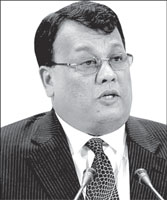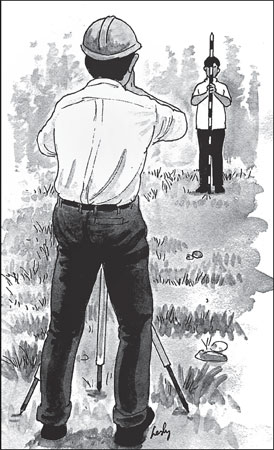So, what can Provincial Councils really do?
 One
of the main problems we have had with regard to devolution is the
failure of our law makers to draft legislation properly. The 13th
Amendment is a case in point, since it is full of confusion about how
power should be exercised. The most obvious example of this is in
relation to what is termed the Concurrent List, where the Constitution
says that, where there is conflict, the decision of the Central
Government will prevail. One
of the main problems we have had with regard to devolution is the
failure of our law makers to draft legislation properly. The 13th
Amendment is a case in point, since it is full of confusion about how
power should be exercised. The most obvious example of this is in
relation to what is termed the Concurrent List, where the Constitution
says that, where there is conflict, the decision of the Central
Government will prevail.
This is not concurrence. When this is pointed out, the response is
that the clause was taken from the Indian Constitution. In India however
that provision did not matter much, since the States had governments
before the Centre did. State governments therefore had experience in
passing legislation, and the Central Government would not counter such
legislation, unless there were potentially destructive consequences.
Provincial Councils
|

Minister Mahinda Samarasinhge |
In Sri Lanka however, Provincial Councils were new, and Jayewardene
compounded the problem by choosing good fighters to head the lists for
the elections that were held. This was understandable, given the
violence in the country at the time, but it put paid to constructive
development in the Provinces, except in Wayamba, where the toughie
chosen also happened to be an able and imaginative administrator. But
even there, hardly any of the powers the Province has were used. Thus no
Province has even thought of establishing Universities, which it is
allowed to do. Some of the problems Provinces have with regard to
teacher supply could be solved by imaginative use of the powers
regarding Education and Higher Education that they possess, but they
have been content instead to stick to existing practice.
I should note though that I have been told by Mahinda Samarasinghe
that he tried to resolve problems relating to transport when he was
Western Province Minister of Transport, but this was knocked on the head
by President Premadasa. This suggests an understanding of the real work
Provincial Councils could do, but unfortunately I don’t think anyone
since then has sought to develop provincial transport in terms of local
needs – and my own view now is that even a Provincial Minister will not
have his ear to the ground to an adequate extent. Powers with regard to
the administration of transport, and institutionalization of mechanisms
responsive to local needs, should in fact go down to the Division.
Incidentally, the manner in which the Jaffna Municipal Council has taken
on some responsibility for school transport shows how effective such
small scale initiatives can be. My argument then is that we should
encourage Provincial Councils to use the powers available to them, by
removing the fear that any regulations they introduce will be
countermanded by Central Government intervention, as occurred to poor
Minister Mahinda Samarasinghe. The obvious answer is to introduce a
consultation mechanism when any conflict arises.
National policy
Consultation should lead to resolution of any dispute in terms of the
Constitution, where the Centre has a dominant role in terms of its
responsibility for National Policy on all subjects. This too is an
aspect which is not emphasized enough in discussion about the problems
of Provincial Councils. Legislation since 1987 had not taken into
account that, given the primacy of Policy made by the Centre, mechanisms
should be in place for ensuring the implementation of such Policy. This
will involve monitoring, with the promotion of satisfactory
implementation by Provincial institutions.

Given this responsibility for National Policy, I cannot really
understand the current arguments about Land powers. In perhaps the only
positive achievement during the bilateral discussions between government
and the TNA, their National List MP and I developed a consensus on land
issues based on the Constitution, which should have been acceptable to
everyone. Of course there were claims for more, and unfortunately this
led to historical disquisitions on both sides, which became emotional.
But had we continued with our discussions, I believe there would have
been no difficulty in accepting the paper we had drafted. We should now,
given the importance of land issues, as indicated in both the Human
Rights Action Plan and the LLRC Action Plan, formulate policy with due
consultation, and then ensure its implementation, not at Provincial
level, which is impossible, but at Divisional level. For this purpose,
of course, both legislation, and regulations, should lay down clear
guidelines about how the Centre will monitor that implementation is in
accordance with Policy, albeit through officials with more immediate
contact with the people.
Prevent duplication of services
I am not sure about the exact balance between officials in this
regard, in terms of whether they report to the Centre or the Province,
but I suppose there could be analogies with officials in a field I have
studied closely in recent months, namely the protection and development
of children. According to the 13th Amendment, ‘Probation and Child Care
Services’ are Provincial Responsibilities, but all that was before we
became signatories to the Child Rights Convention, and understood the
importance of Child Protection and indeed Development. Accordingly, in
the 90s, we set up a National Child Protection Authority, which should
be the apex body for formulating policy and ensuring its implementation.
We also strengthened the Central Probation Department, which appoints
Child Rights Protection Officers to Districts and Divisions, while the
Children’s Secretariat appoints Early Childhood Development Officers.
At a recent consultation we drafted job descriptions for all these
officials, while emphasizing the important of Probation Officers, who
work for Provincial Departments, in being the initial agents of service
delivery. They cannot however ensure coordination with Education and
Health and Police officials, and also the judiciary which has an
important role to play, and this must be done by the NCPA. However, to
prevent duplication of services, we recommended that the Central
Probation Department and the NCPA be combined, or at least work
together, so that there will be coherence of approach, and the
Provincial implementing agencies will be briefed clearly about how
National Policy is to be promoted. |







